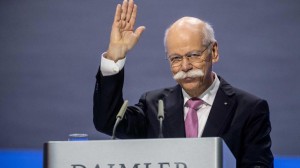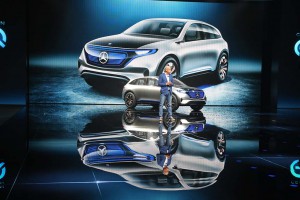Just like that it was over.
By the time, the annual Daimler AG shareholders meeting wrapped up Wednesday evening, Dieter Zetsche’s long, remarkable career with the German automaker had come to an end.
Unlike his high-profile contemporaries in the car business, Carlos Ghosn, the former Nissan Renault chieftain, whose career ended ignominiously with an arrest in Japan last November, and Sergio Marchionne, who died last summer after keeping a deadly illness a secret, Zetsche even got to take a bow at the annual meeting to sustained applause from Daimler shareholders.
During his 43-year career, Zetsche touched almost every part of the company and for the last two decades was involved deeply involved in shaping and fortifying, which like other global automakers, will be sorely tested by rapid changes engulfing the auto industry.
Zetsche was first thrust into the spot light in November 2000, when then-DaimlerChrysler CEO Juergen Schrempp sent him to Auburn Hills to take over the Chrysler Group, which was sinking into one of its periodic funks.
(Daimler AG ushers in new era with massive reorganization. Click Here for the story.)
Schrempp had lost confidence in Chrysler’s American managers and wanted a lieutenant he could trust at the helm in Auburn Hills, a suburb some 30 miles north of Detroit.
During his tenure in Detroit, Zetsche became something of a celebrity. He was featured in the company’s commercials for a brief period and made an indelible impression on journalists around the world who were on hand for the North American International Auto Show by serving beer with a towel thrown over his shoulder at the “Firehouse,” the temporary bar set up in Detroit’s old fire department headquarters across from Cobo Hall. The Firehouse helped inspire the revival of the old building, which is now the Foundation Hotel.
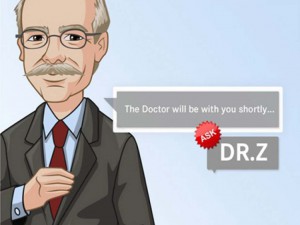
During his tenure overseeing Chrysler Corp. for DaimlerChrysler, Zetsche became the focus of the company's ad campaign as "Dr. Z."
By the time Zetsche left Detroit at the end of 2005 to replace Schrempp as CEO, there was already speculation the merger of Daimler and Chrysler wasn’t working.
Zetsche, who by then was quite familiar with Chrysler’s failings, such as a reputation for indifferent quality and difficult relations with suppliers, ultimately set in motion what came to be known as the de-merger of Daimler and Chrysler, which was completed by the fall of 2007 just as the first tremors from the financial crisis began to shake the industry’s foundation.
Many employees felt betrayed by “Dr. Z,” but the divorce ultimately allowed both companies to escape the financial crisis badly scarred but basically intact. Daimler’s share price gradually recovered, and Chrysler found a more suitable partner in Fiat.
After the Chrysler divorce, Zetsche chalked up several major accomplishments and put his stamp on the company during the past 13 years. For one thing, he is credited with rebuilding the Mercedes-Benz model line and he also rebuilt Daimler’s business in China, which had fallen behind key rivals in the first decade of the new century.
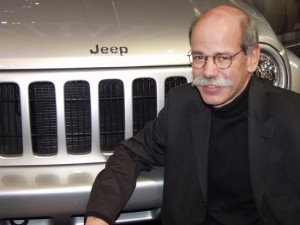
Zetsche helped to ramp up the sales dynamo that is Jeep, including during the Geneva Motor Show several years ago.
“China is now the dynamo” that drives Daimler, absorbing 30% of all the vehicles the company builds and sells, Zetsche told shareholders during his last few hours on the job.
(Click Here for details about the ties between the companies run by Zetsche and Carlos Ghosn.)
The emphasis on new products and the re-boot of Daimler’s position in China eventually cleared the way for Mercedes-Benz to reclaim its traditional leadership in luxury cars sales in 2016. Rivals BMW and Audi had surged ahead for a time thanks to strong sales in China.
Zetsche, however, was also one of the first automotive executives to bless experiments in car sharing with Car2Go and other ventures in the emerging field of mobility services, which are expected to grow more important in the future. He also continued Schrempp’s effort to sell the bits of Daimler, such as MTU, that didn’t fit with the company’s core business of building cars, trucks and busses.
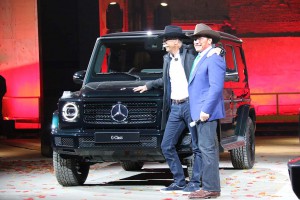
Daimler CEO Dieter Zetsche called on then-Governator Arnold Schwarzengegger to help introduce the new G-Wagen.
Having started his career at Daimler as a trainee in the research department, Zetsche, who has a doctorate in engineering and in his own way was as much a car guy as General Motors’ Bob Lutz, always encouraged subordinates to tinker with the products. Thus, Daimler was actually demonstrating at the annual shareholders the building blocks for autonomous vehicles, well before the Google car made its appearance.
Daimler expects to start testing its first fully autonomous vehicles in California in late summer or early fall.
Zetsche, who like other German auto executives, was a major champion of diesel engines, also came to understand the need for a broader powertrain strategy in the wake of the dieselgate scandal of 2015. He ended his career pushing the development of electric vehicles all sizes and descriptions including over-the-road heavy trucks and all-electric city busses as well as a new line of Mercedes-Benz EVs, which will go on sale in Europe next month.
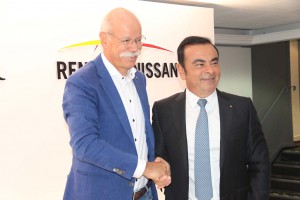
Zetsche and then-Renault-Nissan CEO Carlos Ghosn agreed new opportunities were possible between the two companies.
Zetsche noted during the meeting that he is leaving behind a strong management team, headed by Ola Kallenius, the first non-German to lead the company during 130-year history. Kallenius took over Zetsche’s duties as chairman of the board of management and CEO the end of the shareholders meeting.
(To see more about Zetsche’s retirement from Daimler, Click Here.)
However, Zetsche’s career with Daimler could well have a second act. Members of the Board of Supervisors, effectively control the company’s board of directors under Germany’s co-determination system which guarantees shareholders and labor representatives on the board, are talking about bringing back Zetsche after a two-year “lock-up” period that requires him to step away from the company’s business as chairman of Daimler’s supervisory board sometime in 2021.

